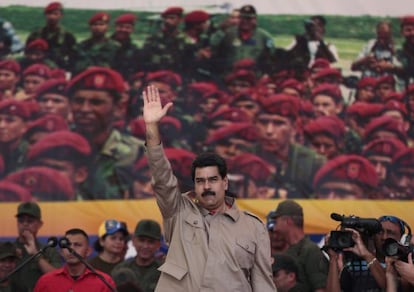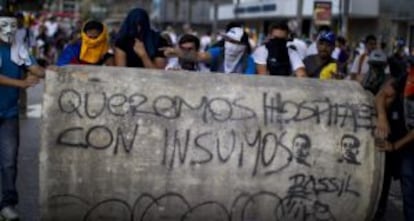Venezuela permits army to use firearms for controlling protests
Watchdog groups say move violates the Constitution and shows government is scared

The Venezuelan army is being given permission to use firearms to keep street protests and public assemblies under control.
The government of Nicolás Maduro signed the resolution this week, and it is expected to go into effect immediately.
According to the document, the proportional use of force will be detailed in “an operating rules and procedures handbook” that will be ready in three months. This manual will serve as the basis for army personnel training.
Rocío Sanmiguel, president of Citizen Control, an armed forces watchdog group, described the decision as rushed and unconstitutional.
“The positive aspects included [in the resolution] are obscured by the mortal use of force,” she wrote on her Twitter account.
The government resolution, which does not distinguish between peaceful and violent demonstrations, clashes with two articles of the Venezuelan Constitution.
Article 68, pertaining to political freedoms, states: “Citizens have the right to demonstrate, peacefully and without weapons, subject only to such requirements as may be established by law. The use of firearms and toxic substances to control peaceful demonstrations is prohibited. The activity of police and security corps in maintaining public order shall be regulated by law.”
There is also much controversy surrounding whether the new resolution violates article 329, which sets limits on the role and responsibility of each law enforcement agency. The resolution encompasses the entire armed forces – army, air force, navy, National Guard and the Bolivarian militias – yet only the National Guard has the power to maintain public order, and only if the police are unable to do so.
“What this shows is that the government is scared of something happening on the streets,” said opposition deputy Stalin González, who is a member of the parliament’s Defense and Security Committee. Even though the committee met last Wednesday, the resolution was not even on the agenda.
This resolution legitimizes the militarization of public order”
Inti González, Provea researcher
“We found out when it was published,” he notes.
Human rights organizations also underscored that the resolution contradicts a ruling by the Inter-American Court of Human Rights against the Venezuelan state for the 1989 “Caracazo,” when the executive rolled out the army to deal with street riots, resulting in hundreds of deaths.
The news has also created alarm among Venezuelans, who still remember the wave of protests against Nicolás Maduro that began this time last year, leaving 43 dead and hundreds injured.
“This resolution legitimizes the militarization of public order,” says Inti Rodríguez, a researcher at Provea, a national non-profit group that is concerned about the growing repression against street protests ever since Maduro took office.

One of his most controversial decisions was to introduce the need to obtain authorization before organizing any march. He also decided to ban protests in certain municipalities outright, under the presumption that violent acts would take place even before the fact.
Meanwhile, the government has been beefing up security with additional corps such as the blue-collar militias, the anti-coup commandos and the special brigades, all of which contribute to militarizing civil society.
The goal is to create a shock response against future public conflict that is likely to occur as a result of the deteriorating economic situation, spiraling inflation, food shortages and subpar public services. In 2014 alone, citizens protested on more than 5,400 occasions, according to non-profit Provea. The Social Conflict Observatory reported 9,286 protests during the same period, half of them aimed against the Maduro administration.
Tu suscripción se está usando en otro dispositivo
¿Quieres añadir otro usuario a tu suscripción?
Si continúas leyendo en este dispositivo, no se podrá leer en el otro.
FlechaTu suscripción se está usando en otro dispositivo y solo puedes acceder a EL PAÍS desde un dispositivo a la vez.
Si quieres compartir tu cuenta, cambia tu suscripción a la modalidad Premium, así podrás añadir otro usuario. Cada uno accederá con su propia cuenta de email, lo que os permitirá personalizar vuestra experiencia en EL PAÍS.
¿Tienes una suscripción de empresa? Accede aquí para contratar más cuentas.
En el caso de no saber quién está usando tu cuenta, te recomendamos cambiar tu contraseña aquí.
Si decides continuar compartiendo tu cuenta, este mensaje se mostrará en tu dispositivo y en el de la otra persona que está usando tu cuenta de forma indefinida, afectando a tu experiencia de lectura. Puedes consultar aquí los términos y condiciones de la suscripción digital.








































